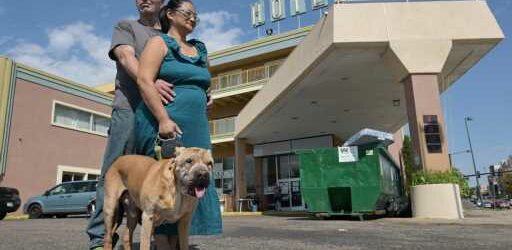Suzann and Lawrence O’Sullivan have one week to find another place to live because the Denver motel where they’ve been staying during the pandemic will no longer operate as a shelter.
The couple may have no choice but to separate so they can live in single-sex shelters serving the unhoused. But Suzann O’Sullivan said she rather would go back to living in their van before she leaves her husband and risks losing their pets.
“It’s been very stressful, depressing,” she said this week about receiving notice to vacate. “I’ve been depressed since the note went out.”
The O’Sullivans are two of the 153 people living at a Quality Inn in Denver who must find another place to live once the motel at 2601 Zuni St. is no longer available as a temporary shelter for people experiencing homelessness. The residents were notified last month that they must leave by Sept. 16 as the Colorado Coalition for the Homeless ends its contract with the motel’s owner.
The coalition decided to shut down the shelter this month in anticipation that the federal emergency declaration for the coronavirus pandemic will expire, said Cathy Alderman, a spokeswoman for the coalition. When that happens, the federal money that paid for the shelter will dry up.
The money was granted during the pandemic to provide housing for people whose age or health conditions put them at risk of serious complications or death if they contracted the virus. Motels such as the Quality Inn allowed people to have individual rooms with private baths rather than a traditional shelter where beds are spaced around a large open room and where bathrooms are shared.
“Our efforts to protect people from COVID were good,” Alderman said. “These motels were a critical resource. We’re proud of the effort but we always knew they were temporary.”
Once the Quality Inn shelter closes, two more COVID-related motels will remain open, said Angie Nelson, deputy director of housing stability and homelessness resolution at the Denver Department of Housing Stability. No closing dates have been planned for those two remaining shelters.
One shelter is managed by the city and is funded through the end of December, Nelson said. The hotels have cost millions to operate.
The other is a motel the coalition bought during the pandemic and is reserved for those who have COVID-19 but don’t need to go to a hospital, Alderman said.
As of Monday, 293 people lived in Denver’s three pandemic shelters. Of the 153 at the Quality Inn, about 40% of the residents have a place to go and about 30 already moved out, Nelson said.
Throughout the pandemic, 446 people who stayed in the motels have moved to permanent housing, she said.
“Ultimately, we know this kind of closure and transition is a tough one,” she said. “These kinds of transitions can be difficult. We’ve known it was a type of transition that needed to occur at some point.”
The coalition and the housing stability office are working to find new housing for the people living at the Quality Inn. But it’s not easy, Alderman said.
There aren’t enough housing vouchers, which are used to pay for traditional apartments, for everyone and even when a Quality Inn resident receives a voucher, it’s hard to find an affordable apartment that will accept them, she said.
“That doesn’t mean we won’t stop trying,” Alderman said.
The O’Sullivans started living in a van in February 2019 after Lawrence O’Sullivan lost his job as a journeyman painter. Their savings lasted two months and then they were evicted from their apartment. The couple spent nearly a year living in the van before learning about the temporary motel program, Suzann O’Sullivan said.
It was their first time being without housing, she said.
“Some of us don’t live that type of lifestyle,” Suzann O’Sullivan said. “We don’t know how to camp on the streets. Granted, we lived in our van, but it was hard as hell. Scary, too.”
The couple qualified for a motel room because of Suzann O’Sullivan’s health problems. She has a heart murmur and asthma and uses a machine for routine breathing treatments. She also is disabled after she was injured in 2011 while working at the Reno Air Races in Nevada when a plane crashed into spectators.
The Quality Inn is their second location because another one off East Colfax Avenue closed earlier this year.
The motel room was a blessing because it gave the O’Sullivans privacy, a clean bathroom and beds where they could stretch out to sleep. And, most importantly, they could keep their pets — Phakahlolo, a 14-year-old Sharpei/pit bull mix, and Neo, a 15-year-old cat.
With a week to find a new place, the O’Sullivans are in a pinch.
The coalition has reserved beds for them at shelters, but those shelters are single-sex facilities, meaning the O’Sullivans, who have been married for 21 years, will need to separate. Suzann O’Sullivan has been assigned a bed at a shelter that will accept the pets but she will be required to keep them in a crate and with her at all times.
These options don’t suit her, she said.
“It’s unfair that they’re separating families and people with pets and just shoving us into the shelters where most of us usually don’t go,” she said.
“I can’t do that. I can’t keep my cat in a bag all the time,” she said. “And right now with it being hot I’ll have breathing problems.”
The O’Sullivans illustrate how complicated housing can become for people going through a hard time.
To qualify for a voucher, they need identification. But a backpack with all of their documents, including birth certificates and driver’s licenses, was stolen when they were living in their van. They’ve spent the past 20 months trying to get those documents with the help of caseworkers from the coalition.
It’s been a bureaucratic nightmare trying to track down paperwork during the pandemic, she said. They spent Sept. 2 — her birthday — at a Denver DMV office trying to get a driver’s license for her husband. His paperwork is under review.
But even if he gets the license, it will take a time to get a housing voucher and even longer for an apartment to open up.
“It fell apart really fast and we’ve never been in this situation,” Suzann O’Sullivan said. “I can’t believe we’re on two years. ”
Alderman said she understands the frustration. But she also can’t promise everyone an apartment or motel room somewhere else.
“This is a less than ideal situation for everyone,” she said. “We certainly are scrambling, and the folks who are there are scrambling. That’s, unfortunately, the nature of emergency services.”
Source: Read Full Article




